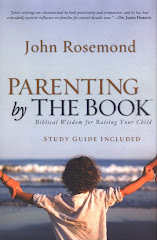I almost missed it. I tore through this chapter, surprised at its brevity and somewhat disappointed that it didn't have more meat to it. After all the revelations I've been experiencing in the preceding chapters, I thought this one was kind of no brainer. I mean, come on, if you're reading this book in the first place you're probably already convinced of the Bible's authority, or at least you're already convinced that discipline is a good thing and very important.
But as I was reflecting on how to spin a decent post out of a 5 minute chapter it hit me: I'm doing exactly what John Rosemond described in the intro to Part Three. I'm looking for methods when I should be concentrating on my point of view. My disappointment with Chapter 9 stemmed from my impatience. In my head I've been saying, "Yeah, yeah, yeah. I already know this part. Just tell me what to do." But God is slowing me down and giving me lots to think about.
In Lesson 1 of The Truth Project, Focus on the Family's 12-week teaching series on biblical worldview, participants are asked (rhetorically) "Do you really believe, that what you believe is really real?" The point is that if we really believe in the existence and authority of God and the Bible, not just in our heads but in our hearts, then our actions and lives will undeniably reflect that belief or worldview.
This came to mind as I pondered Chapter 9. I know the Bible says discipline is good, even punishment, and Rosemond provides several scripture references to back that up. But have I internalized that truth to the point where it governs my actions? Or am I still straddling the fence between God's Truth and secular postmodernism? Do I really believe that what I believe is really real? The discussion questions on page 197 help us probe this issue, especially #2 & #4, and I urge you to give them some thought and prayer.
Rosemond posits, "No method will work for long in the absence of the right point of view. On the other hand, just about any method will work for a parent with the right point of view. The one and only right point of view is the biblical one." (page 187) This pulls the lens back even farther than last week when we looked at seasons of parenting, or the week before when we learned how to be farsighted. Here we're talking about an eternal point of view which should shape and guide our day to day decisions.
But here's where it starts to get tough for me. How does this look in real life? The other day I was listening to a teaching on Proverbs, which is all about the pursuit of wisdom. We all need that, right? Well, the speaker said that knowledge is the acquisition of information, but wisdom is what we do with that knowledge. Whoa - that caught my attention. As an avid reader with a natural curiosity and thirst for info, I am constantly acquiring knowledge. But if I'm not applying it, it's not doing me much good - it could even be dangerous as the old saying goes. lol Where parenting is concerned, this book has given us plenty of knowledge about pervading psychological theories, about sound biblical principles, and in this chapter about right point of view. But how does this knowledge translate into decisions and actions? For example, just to name one issue I'm dealing with right now, how does an eternal point of view help me and my teenage son orchestrate his extracurricular schedule? (or his curricular one, for that matter?) These are questions I continue to wrestle with.
So as you can see, this chapter is anything but a toss off for me. Perhaps I'm off on a wild tangent, but then again, Rosemond is speaking the very Word of God, which is never a toss off. On the contrary, it's living and active and pertinent to our 21st century lives.
CJ Mahaney’s Christmas Book List 2017
8 years ago







